Jeannine Hall Gailey's Blog, page 62
May 24, 2015
Success, Jealousy, Submission, and How Hard Are You Willing to Work
Well, I’ve been in a bit of a funk lately, I’m not ashamed to admit it. Sick cat, then putting her down, and a two week bout with some mystery virus that’s left me tired and worn out. I haven’t been writing, sending out, or promoting my new book enough. Enough for me to be happy with? Enough to be effective? But what does enough look like?
A little post on Medium this morning by my friend Kelli reminded me of this. This post reminded me that part of success really is, no matter what, tied to how hard you’re willing (and able) to work. You can have a ton of talent, wonderful writing, but if you don’t get it out of your head, out of your hard drive, out your door and into the world, guess what? No one will know. How women sabotage themselves by not thinking their work is good enough to send out, or, if they’re anything like me, they just think sending their work back to an editor who asks for more is “rude, because I should wait at least six months before submitting again.” Because that is what is in my head. A lot of rules that no one ever told me, that I just absorbed at some point from the world around me. I think of myself as a fairly aggressive submitter – I probably average about 20 subs at least per quarter. But maybe not aggressive enough?
A lot of the writing game is about numbers. The more you send out, most of the time, not always, but most of the time, the more you will get published. The more you write, the more you have to send out. So spending your time writing, polishing, and sending out your work will stop you from sabotaging your self. Spending your time feeling sad and listening to sad music and wishing you had things you don’t, well, that’s not so productive.
Sure, there are dream stories: the writers with 200K book deals right out of the MFA gates at 24. Poets & Writers always seems to have a lot of those quicky miracle success stories, though when I meet the poets and writers I admire in real life, they more often tell me stories of years of struggle, pain, impatience, rejection. Writers may seem to win awards and fellowships with ease; sometimes you will not feel good about it. Here’s a post I happened upon today, and I encourage you to read not just the letter and answer, but the comments, which tease out some subtleties that the letter and response, both being a little simplistic, do not: Dear Sugar on Writer Jealousy. Because there are some truths in the letter, the response, and the comments. Seeing people get the things you want and work for sometimes hurts. Sometimes that’s because we’re entitled, maybe, as Sugar suggests. Sometimes it’s because we feel insecure, as some of the commenters suggest. Do those feelings do us any good? Maybe, if it motivates us. Maybe, if it keeps us writing and sending out work.
I was thinking about the difference between my thirties, when I was more optimistic and energetic, maybe more insecure too, and now, in my forties, that I feel less insecure, but I’m getting worried that I’ve spent an awful lot of hours and emotional energy on something I’m never really going to get rewarded for. I genuinely feel happy when good things happen to my friends, even acquaintances, because I think: those people genuinely deserve it. They’ve worked hard, they’re great writers, and I think, yay, the system works! When it doesn’t happen for me, but it happens for them, at least it happened to someone good, someone who deserved it.
These days, and maybe it’s not just physical, I feel tired. Tired of sending things out to rejection or worse, no response at all. (It happens.) Tired of putting out my best efforts, to feel like they fall into a vacuum. I mean, for poets, this is normal, right? Most of the time, poets not only don’t win at life (historically, there’s a lot of consumption, alcoholism, and suicide in this line of work), they don’t get paid, they don’t get recognition, no one notices what they do. I’ve talked before about average book sales for poets. What is the real bar for this thing I think of as “poetry success?” What’s the difference between optimism and false hope? When you work as hard as you can, and the results aren’t what you’ve dreamed of, what then? I was just reading the comments of several women on Facebook, older than me, who have become so discouraged they haven’t stopped writing, but they’ve stopped even being interested in sending out work ever again. I hope that doesn’t happen to me. I am willing to work, but I worry that the discouragement gets to you over time, that the constant doubt, disappointment, and rejection somehow rewire our brains to think “I will never be successful at writing, so I give up.” I sometimes think, if I don’t get a “sign from the universe,” I’m going to do something else with my time and energy. But then I write another poem.
May 5, 2015
What We Give Power To, What We Remember: Rejections Versus Achievements
What We Give Power To, What We Remember: Rejections Versus Achievements
First of all, thank you to Every Day Poems for featuring a poem, “The Robot Scientist’s Daughter [villainess]” from The Robot Scientist’s Daughter on its site.
So, I don’t know about you, but I’ve been keeping my rejection slips in photo albums, shoe boxes, or tacked onto cork boards since I started writing and submitting poems – when I was nineteen.
The other day I happened upon a photo album with about ten years worth of rejections: finalist notices for book contests I never won, kindly remarked rejections from journals I’ve never gotten into. It was really kind of a…bummer. Sure, as other famous writers have remarked, rejections are a sign that you’re doing the work of submitting. They keep us humble. In my case, they remind me of where the hell I’ve sent work and what different editors thought of it at various times. But maybe keeping them to the exclusion of the good things that happen in the writing life is doing us no favors.
So, to counter the effect of looking over ten years of kind rejections and unsigned rejections, “this came close” notes, I decided to create a scrapbook. I’m not really a scrapbooking girl, but this seemed important (plus Barnes & Nobles had a scrapbook kit on sale for half-off.)
I started to look up any signs of good things that had happened in my writing life, to see what I had kept. A newspaper clipping from a campus visit for my first book, Becoming the Villainess. A clip from the Seattle Times about my first book. A check from one of my first publications. A reminder that I’d met a lot of college-day poetry heroes like Denise Duhamel and Dorianne Laux. My husband printed out quotes from nice reviews, and found letters of acceptance and awards. I went through years of pictures I’d never printed out – my writing groups, my readings, AWP, meeting up with poets I’d admired at Poetry Festivals and Summer Writing Conferences – from the last ten years. I picked my favorites, and printed out this evidence of poetry success, fun, and friends (along with some really unfortunate hairstyles and colors). One of the lessons I learned from this? Keep more of the good stuff, let go of the bad stuff. Don’t treasure your failures more than your successes.
Maybe your thing isn’t scrapbooking. But think about the mementos you’re allowing to take up space – physical, mental, emotion – and think about replacing the mementos of discouragement with ones that encourage you, that inspire you, that remind you of the good places you’ve been and people you’ve met along the way.
May 2, 2015
Winners of the April Giveaway, a new review of The Robot Scientist’s Daughter (plus lilacs, how old, and poetry parties!)
Sorry I’ve been away from the blog on a short trip celebrating my birthday. There were lilacs and dogwood in bloom, as you can see – on April 30! And cherries for sale on the roadside on the way home – cherries?? Now?? Usually we don’t see them til June. Anyway, besides the strange spring bloomings, it was a much-needed break – and now I’m glad to be home.
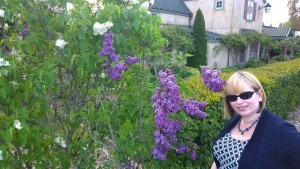
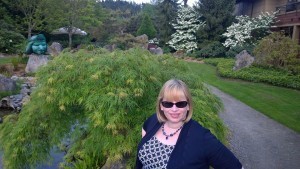
Winners of April’s Big Poetry Giveaway according to a random generator set between 1 and 24 are: #3 Sarah O’Brien (who won The Robot Scientist’s Daughter) and #17 Jon Desjardins (who won Don Mee Choi’s The Morning News is Exciting.) I will be e-mailing them both to get their addresses and send them their respective books (and bonus literary magazines.) Thanks to everyone who participated! If you left a comment on my poetry giveaway page, and you still want a copy of The Robot Scientist’s Daughter, you can get a specially discounted copy from me if you e-mail me at jeannine dot gailey at live dot com!
Thank you to Suko’s Notebook for this birthday-timed review of The Robot Scientist’s Daughter. “Overall, The Robot Scientist’s Daughter is a startling, commanding, and beautiful collection of poetry. Her use of language is exquisite and extraordinary.” A nice birthday present!
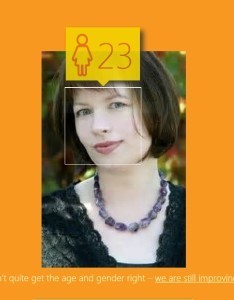 As was the Microsoft robot that told me that, based on my pictures, I’m somewhere between 29 and 16, which is pretty reassuring when you’re celebrating your 42nd birthday! Here’s my Napa author’s photo, from four years ago (my most recent author photo is the one that somehow came out as 16?? So perhaps some more tweaking of its algorithms is needed.)
As was the Microsoft robot that told me that, based on my pictures, I’m somewhere between 29 and 16, which is pretty reassuring when you’re celebrating your 42nd birthday! Here’s my Napa author’s photo, from four years ago (my most recent author photo is the one that somehow came out as 16?? So perhaps some more tweaking of its algorithms is needed.)
Don’t forget that today is also Independent Bookstore Day, so go visit your local indie bookstore and buy a book (or two!) My choice in Seattle is Open Books, the poetry-only bookstore that just celebrated its 20th anniversary. Here’s a pic of me posing a few days ago at their anniversary celebration with local poetry glitterati Kevin Craft and Kathleen Flenniken. See? I’ve been to too many parties lately! Time for some May downtime! Anyway, happy May!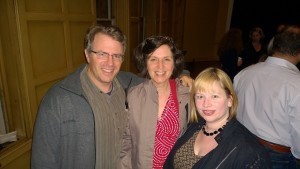
April 28, 2015
New Interviews and Reviews of The Robot Scientist’s Daughter (with Dogwood)
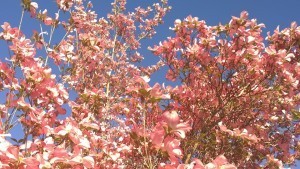 Well, I was feeling down in my last post, but I have to say, since then, I wrote some poems, sent out some poems, and nothing but nice things have happened with the new book, so it’s hard to stay down! I’m almost out of copies from selling so many, and several nice interviews and reviews have appeared. It was eighty degrees yesterday and I went out to take pictures of the pink dogwoods. I haven’t seen so many blooms like this since I lived in Knoxville. These particular types of dogwood trees didn’t do well here in the Northwest when I first arrived, and they’ve been getting stronger and flourishing over the past couple of warmer springs.
Well, I was feeling down in my last post, but I have to say, since then, I wrote some poems, sent out some poems, and nothing but nice things have happened with the new book, so it’s hard to stay down! I’m almost out of copies from selling so many, and several nice interviews and reviews have appeared. It was eighty degrees yesterday and I went out to take pictures of the pink dogwoods. I haven’t seen so many blooms like this since I lived in Knoxville. These particular types of dogwood trees didn’t do well here in the Northwest when I first arrived, and they’ve been getting stronger and flourishing over the past couple of warmer springs.
Like me! Though I’ve been down with a cold this week, it’s nothing like the pneumonia and severe flus and broken bones I dealt with over the past previous springs. And I’m thankful.
Updated: And, thanks to The Alternating Current Press Blog The Spark for this remarkable interview about the Robot Scientist’s Daughter with Lori Hettler.
Thanks to Gautami at the Everything Distils into Reading book blog for her review of The Robot Scientist’s Daughter: http://readbookswritepoetry.blogspot.com/2015/04/the-robot-scientists-daughter-by.html
And I have a few tips for how to throw a book launch party up at the Davio and Gailey blog here: https://gaileyanddavio.com/2015/04/28/five-tips-for-planning-a-successful-book-launch-party/
Two more days til I turn 42. Every birthday I have a little bit of that feeling of measuring up, trying to figure out if I’m where I’m supposed to be, if I need to tune in to something I’ve been missing. I’m trying to give myself more time to write, even in the middle of chaos, each day. I’m trying to figure out where we’re going – literally (we’ll be moving soon) and figuratively. I think I’m lucky to have made it this far. I’m making wishes.
April 26, 2015
Interview with Jehanne Dubrow about The Arranged Marriage
Today I’m interviewing Jehanne Dubrow, Director of the Rose O’Neill Literary House, Associate Professor of creative writing at Washington College, and editor of the new (terrific!) journal Cherry Tree. I’m asking her a few question about balancing her roles and writing life, her new book, and what it’s like to have her fifth poetry book, The Arranged Marriage, come out!
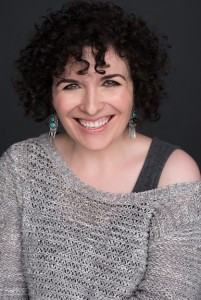 BIO: Jehanne Dubrow is the author of five poetry collections, including most recently The Arranged Marriage (U of New Mexico P, 2015), Red Army Red (Northwestern UP, 2012), and Stateside (Northwestern UP, 2010). Her work has appeared in Virginia Quarterly Review, The New England Review, Prairie Schooner, and Hudson Review. She is the Director of the Rose O’Neill Literary House and an Associate Professor of creative writing at Washington College, where she edits the national literary journal, Cherry Tree. Her web site is: http://jehannedubrow.com
BIO: Jehanne Dubrow is the author of five poetry collections, including most recently The Arranged Marriage (U of New Mexico P, 2015), Red Army Red (Northwestern UP, 2012), and Stateside (Northwestern UP, 2010). Her work has appeared in Virginia Quarterly Review, The New England Review, Prairie Schooner, and Hudson Review. She is the Director of the Rose O’Neill Literary House and an Associate Professor of creative writing at Washington College, where she edits the national literary journal, Cherry Tree. Her web site is: http://jehannedubrow.com
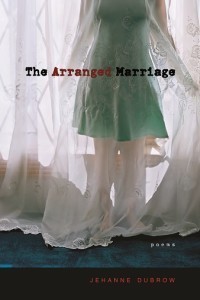 Jehanne Dubrow’s newest book, The Arranged Marriage, is a complicated book full of insightful, lyrical descriptions of the shadow side of family, with a dark background buzz of the conflicts of politics and religion. It’s a book, really, about the brokenness of relationships, the damage that can be done by marriage, the costs of being a woman. It teases out the excruciating small sacrifices, the tiny kindnesses, of a damaged partnership.
Jehanne Dubrow’s newest book, The Arranged Marriage, is a complicated book full of insightful, lyrical descriptions of the shadow side of family, with a dark background buzz of the conflicts of politics and religion. It’s a book, really, about the brokenness of relationships, the damage that can be done by marriage, the costs of being a woman. It teases out the excruciating small sacrifices, the tiny kindnesses, of a damaged partnership.
As the Director of the Rose O’Neill Literary House, an Associate Professor of creative writing at Washington College, the Series Editor of the Literary House Press and Founder and Editor of Cherry Tree: A National Literary Journal, well, you seem to be wearing a lot of hats! Do you have a favorite part? How do the different parts of your work inform your poetry, and how to they affect the way you send to publishers or editors (if it does?)
JD: One of the things I appreciate about my hybrid position (part faculty member, part administrator) is that I get to do all of the things I love: teach, program literary events, mentor students, edit, and dream big. My writing informs my teaching, teaching my work as an arts administrator, art administration my vision as an editor. In the classroom, reading recent poetry and nonfiction collections with my students, I’ve been able to reflect on my manuscripts-in-progress, to think about where my work fits in the literary conversation and which presses might be advocates for my writing. Overseeing the Literary House’s semesters of themed programming and Summer Poetry Salon Series, I have come to understand just how important it is to be a good citizen in our community, not to mention how meaningful it is for students to interact with gifted writers. Editing Cherry Tree and the books that the Literary House Press produces, I’ve built relationships with writers across the country and have learned so much about craft from handling unpublished poems, short, stories, and essays.
Your latest book, The Arranged Marriage, is number 5 (!!) for you! How are you approaching your book launch year differently this time around? What do you think you’ve learned from your previous book launches about promoting poetry?
JD: With each collection, I have come to appreciate more and more that marketing a poetry book is all about making personal connections and about identifying one’s ideal readers. My wonderful mother serves as my “mom-ager”; she’s fearless when it comes to reaching out to colleges and universities, potential venues for events, writers’ conferences, and festivals. Before the publication of a book, my mother and I discuss possible audiences, publicizing the book appropriately. So, for instance, The Arranged Marriage is a book that might appeal to those interested in Women Studies, American Jewish literature, Central America, prose poetry, or contemporary poetry in general.
Speaking of your new book, I thought one line (related to the title) really revealed the heart of the book: The first line from “Set Jerusalem Above My Highest Joy—Psalm 137”“Every marriage is arranged to be /broken.” Can you discuss?
JD: The Arranged Marriage explores different forms of forced intimacy. Yes, the book considers an actual arranged marriage, but it also examines how even those relationships entered into consensually can be shattered, how they can wound us. There’s also a terrible moment of trauma at the heart of The Arranged Marriage. When my mother was a young woman, she was held hostage at knifepoint by a man who had escaped from an asylum for the criminally insane. Writing The Arranged Marriage, I came to understand that this moment of violence was a kind of arrangement of the fates, a closeness that could have broken my mother if she hadn’t been so strong.
Many of your books deal with conflicts of a different, more global nature (the stresses of life in the military, childhood in a Communist-controlled nation, etc.) and this one feels more intimate, more personal. I was thinking of it as a director narrowing the focus of her camera. How different/difficult was it to write this particular book? How has it been giving readings? I saw in your study guide that you interviewed your mother for this book; was that a difficult/rewarding process?
JD: The Arranged Marriage is based on two years’ worth of interviews with my mother. Occasionally, the collection felt as if it wrote itself. Even before I spent time interviewing my mother in a formal context, I already knew these stories well. Reading publicly from this book has been very intense; the collection is dark, in some cases terrifying, and audience members tend to react quite forcefully to the edge-of-the-seat tension of many of these poems. If my mother is in the audience, people often want to speak with her about the book, tell her how brave she is, or ask what it feels like to the subject of a collection of poetry. Throughout the process of drafting and promoting The Arranged Marriage, it has been important to me that she feels comfortable. Her story is hers. The book is something separate—it’s my translation of her narrative.
OK, a little switch from content to form. I know you’ve written prose poems in the past, but this book’s poems all match in terms of form – a prose poem in a narrow column. Was this to signal journalistic reporting? What was the significance of this form for you?
JD: Yes! I thought of these poems as a form of reportage. They’re still lyrical, compressed narratives, but the voice I use is detached, the point of view often third-person. I wanted to find a way to narrate my mother’s experiences from a distance, so that I could speak more clinically about trauma and so that I could explore the ways in which trauma itself often forces those in pain to disengage, to separate emotions from the body and the self.
Thanks to Jehanne for this thoughtful interview!
April 24, 2015
New Reviews of The Robot Scientist’s Daughter and a Little Letdown
First of all, thanks to Darlene at Peeking Between the Pages for this new review of The Robot Scientist’s Daughter! This blog book tour has been really fun to be part of; I have to say I really love hearing what non-poet-types have to say about my book!
Update: Here’s another review of The Robot Scientist’s Daughter, just posted up at Patricia’s Wisdom. Thanks again! As you may be able to tell from the rest of the post, today I definitely needed the pick-me-up!
I got sick the night before my parents left, a couple of days after the launch, and since then have been a little down. Also, the beautiful sunny spring weather turned cold, windy, and bitter. One of my friends yesterday reminded me of the very real phenomenon of “letdown” after a book launch, so I thought I’d write a little about that today.
This is my fourth poetry book (and fifth book), yet every time a book comes out, I can’t help but think, “This might be the one that takes off, that changes my life.” And then, well, it doesn’t. You go back to your laptop, and if you’re anything like me, you get out the notebook of your rejection slips from the last five years, look at the nice notes from great publishers and places that haven’t ever taken your work, and rejections from places that did eventually take your work, and it makes you take stock of what you’re doing, where you’re going, which frankly, can sometimes feel like “I am crazy for doing this.” And I think, though I do not know for sure, that this happens to everyone. You think: “Why am I writing?” and “Why in God’s name am I writing poetry?”
And the weird thing is, The Robot Scientist’s Daughter is probably doing pretty well, for a poetry book – maybe better than most of my other books. It’s got a bunch of reviews already, it sold pretty well in its first month, and I got a lot of pre-orders for it. But it still sort of feels like failure. I mean, I’ll think to myself: Look at my Amazon rankings. Look at the fact I only have three Amazon reviews so far. I haven’t gotten a review in The New York Times, or a mention on national radio or television. No one has put me on any lists of “poets you have to read” or “best books of 2015 so far.” So why did I even bother writing this book? (For an essay about why I bothered writing this book, see here.)
So if you get this feeling after your book comes out, remember, it’s normal. I probably just need a lot of sleep, a little chocolate, maybe a few therapeutic episodes of Mystery Science Theater 3000. By the time my next reading for the book comes up on May 13, I’ll probably be full of optimism and hope again. I’ll be another year older. I hope I will have written a new poem.
New Review of The Robot Scientist’s Daughter and a Little Letdown
First of all, thanks to Darlene at Peeking Between the Pages for this new review of The Robot Scientist’s Daughter! This blog book tour has been really fun to be part of; I have to say I really love hearing what non-poet-types have to say about my book!
I got sick the night before my parents left, a couple of days after the launch, and since then have been a little down. Also, the beautiful sunny spring weather turned cold, windy, and bitter. One of my friends yesterday reminded me of the very real phenomenon of “letdown” after a book launch, so I thought I’d write a little about that today.
This is my fourth poetry book (and fifth book), yet every time a book comes out, I can’t help but think, “This might be the one that takes off, that changes my life.” And then, well, it doesn’t. You go back to your laptop, and if you’re anything like me, you get out the notebook of your rejection slips from the last five years, look at the nice notes from great publishers and places that haven’t ever taken your work, and rejections from places that did eventually take your work, and it makes you take stock of what you’re doing, where you’re going, which frankly, can sometimes feel like “I am crazy for doing this.” And I think, though I do not know for sure, that this happens to everyone. You think: “Why am I writing?” and “Why in God’s name am I writing poetry?”
And the weird thing is, The Robot Scientist’s Daughter is probably doing pretty well, for a poetry book – maybe better than most of my other books. It’s got a bunch of reviews already, it sold pretty well in its first month, and I got a lot of pre-orders for it. But it still sort of feels like failure. I mean, I’ll think to myself: Look at my Amazon rankings. Look at the fact I only have three Amazon reviews so far. I haven’t gotten a review in The New York Times, or a mention on national radio or television. No one has put me on any lists of “poets you have to read” or “best books of 2015 so far.” So why did I even bother writing this book? (For an essay about why I bothered writing this book, see here.)
So if you get this feeling after your book comes out, remember, it’s normal. I probably just need a lot of sleep, a little chocolate, maybe a few therapeutic episodes of Mystery Science Theater 3000. By the time my next reading for the book comes up on May 13, I’ll probably be full of optimism and hope again. I’ll be another year older. I hope I will have written a new poem.
April 18, 2015
Book Launch Reading Report and a New Review of The Robot Scientist’s Daughter
Survived the Seattle book launch of The Robot Scientist’s Daughter in good cheer. Jack Straw played a wonderful host, my Dad, Glenn, and Kelli all brought flowers (so many flowers!), Evan and Kelli did a great job as emcee and opening readers, respectively, and lots of wonderful folks in the audience – even an old friend from high school! People seemed to enjoy the reception afterwards, especially the robot cupcakes, which were a big hit! Anyway, no disasters, sold some books, and here are some pics from the event! (and a link to YouTube if you want to watch the reading yourself from home.)

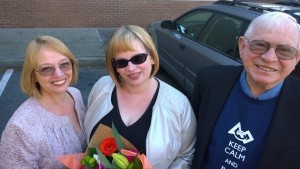
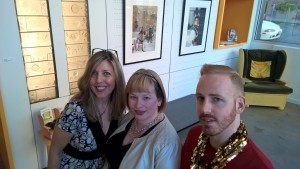
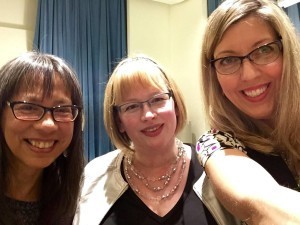
A new review of The Robot Scientist’s Daughter by Melanie Teabird (isn’t that a beautiful name?) went up yesterday too. I’m so thankful for the kind reviews!
I was so excited about having one of my apocalypse poems up on The Rumpus on the 16th, too. Isn’t it funny it went up on the same day as the reading? With poetry, it’s months of hearing nothing, then everything on the same day so you’re all “celebrate five things at a time!” Anyway, all the poems The Rumpus posts in April every year are really fun reading, so check them all out.
Yesterday we drove up to Skagit Valley to take the parents, with my little brother and his wife, to the tulip fields for the last hurrah (as they announced they were cutting down all the tulips after this weekend – for the record, that’s super early, and the Tulip Festival officially lasts through the end of April.) One of the things that struck me this year was not only were the daffodils and tulips early, but when we went this time, the cherry and apple trees were still blooming, dogwoods and the lilacs and azaleas were up as well. Really beautiful but confusing, seasonally! Here’s a weirdly overexposed shot of me and my mom in the tulip fields, a bald eagle we saw, and a tangle of apple branches and cherry blossoms from La Conner.
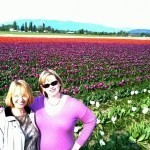

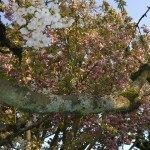
April 16, 2015
The Robot Scientist’s Daughter Book Tour Starts Today: In Real Life AND Virtual!!
Today’s the day! Tonight is the kickoff of my book tour and the Seattle book launch event for The Robot Scientist’s Daughter with MC Evan J. Peterson and opening reader Kelli Russell Agodon at the lovely Jack Straw Cultural Center at 7 PM (readings with champagne reception following!) Robot swag! Radiation poetry!
Thanks to The Rumpus, who featured my poem “Apocalypse (with HGTV Magazine)” today!
And my official virtual tour, a blog book tour, kicks off today too, with an interview by Serena at Savvy Verse and Wit! You can read about why Ilya Kaminsky and Dorianne Laux were inspirations for writing The Robot Scientist’s Daughter, why it was the most difficult book for me to write, who my favorite under-appreciated poets are, and why I believe social media is a good thing for poets.
In this brief interview on favorite poets at the Straight Forward blog, I discuss one of the poems I memorized when I was eleven, a most memorable poetry reading experience, and totally cheat when asked who my favorite poet is!
And, just to prove that the review life of a poetry book can last years instead of months, just as my fourth book makes its Seattle debut, here’s a lovely review of Unexplained Fevers at The Spark, the Alternating Current blog, by Julia Hy.
Well, since I’m posting this at 1:30 AM on the day of the reading (reading jitters anyone?) I should go to sleep so I’ll be awake in time for the book launch! Hope to see some of you there in real life, and those who can’t make it, hope you find the interviews and reviews entertaining!
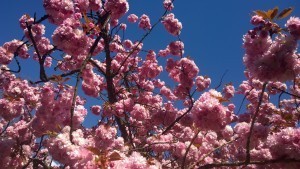 It’s almost my birthday, as well, which always makes National Poetry Month a little more fun (and likely to have parties involved) – and this year we’ve got a parade of – because of some crazy weather – lilacs, cherry blossoms, tulips, azaleas, rhododendrons, an apple blossoms – all at the same time! Here’s a little puffy pink “sakura” cloud action to cheer your month! Happy April!
It’s almost my birthday, as well, which always makes National Poetry Month a little more fun (and likely to have parties involved) – and this year we’ve got a parade of – because of some crazy weather – lilacs, cherry blossoms, tulips, azaleas, rhododendrons, an apple blossoms – all at the same time! Here’s a little puffy pink “sakura” cloud action to cheer your month! Happy April!
April 12, 2015
Book Launch This Thursday in Seattle, Plus a Little Residency News!
So, the big Seattle book launch and party for The Robot Scientist’s Daughter is this Thursday, 7 PM, at The Jack Straw Cultural Center, for those of you in the area – I hope you can come! Evan J. Peterson, our MC, may, I’m told, may have a robot costume planned, and Kelli Agodon is always a delight to hear from – plus, my folks are flying out from Ohio to be there – craziness! Champagne (well, Prosecco, anyway) reception following, plus, robot swag!
Now, while everyone was at AWP, I was feeling a little sad about missing out, but I did get some good news – I’m going to a residency this September! A working marine biology field station on the San Juan Islands that also hosts writers, artists, and scientists called The Whitely Center. This is the first writing residency I’ve tried to go to since years ago at Centrum, so I am so excited and have high hopes about finishing up this next apocalypse-themed book manuscript I’ve been working on for the last couple of years.
So, hope you are all having a good April/National Poetry Month so far, and if you’re not too tired from AWP, go out and check out some poetry at your local library and bookstore. Go to a poetry reading and buy the reader some coffee, if not their book.




